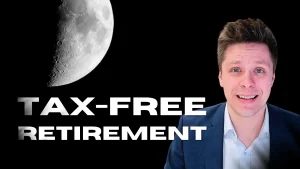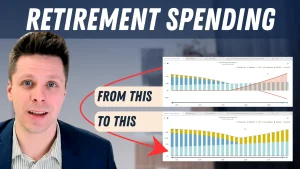[vc_row][vc_column][vc_video link=”https://youtu.be/TQrIlisCLsA”][/vc_column][/vc_row][vc_row][vc_column][vc_column_text css=”.vc_custom_1672760792715{padding-top: 20px !important;padding-bottom: 20px !important;}”]Today we looking at deferring your Old Age Security Pension, whether or not it makes sense, and a major red flag you need to consider if you are going to defer.
Eligibility
For many people, the Old Age Security (OAS) pension will make up a portion of their retirement income. To be eligible for OAS, you must have resided in Canada for 10 years after the age of 18, and to receive the maximum benefit, you must have resided in Canada for 40 years after the age of 18.
Unlike the Canada Pension Plan, the OAS pension is not based on your employment income, it’s simply based on how long you’ve resided in Canada.
Most people receive the maximum so that’s the figure we’ll use today.
The maximum pension you can receive is $685.50 (Old Age Security payment amounts – Canada.ca Oct-Dec 2022), which would begin at age 65.
Benefits of Deferring
When you defer your OAS, your monthly payment increases by 0.6% per month.
However, you can elect to defer your OAS pension and by doing so, you would receive a bonus of 0.6% per month.
For example, If you begin your OAS at 65 you would receive a monthly payment of $685.50. If you begin your OAS at 65 plus one month, you would receive $689.61 per month.
It’s not a huge difference over a month, but after a year, your OAS would be increased by 7.2%. At most, you can defer your OAS to age 70. At that point, your monthly OAS pension would be 36% higher than what you would have received at age 65.
Reason to defer
A couple of the reasons you may want to consider deferring your OAS pension are:
- You are still working
You may want to defer your OAS if you don’t require the extra income. Additionally, if you are still working, you’ll likely be in a higher tax bracket and a large portion of the OAS would be lost to taxes.
- You want to protect against longevity risk
In speaking with many retirees, one of their biggest concerns is running out of money in retirement. By deferring OAS, retirees can ensure that they have a higher base income for the rest of their lives. This would involve spending down funds from RRSPs and TFSAs and deferring OAS as long as possible.
For example, John and Mary retired at 65. They were concerned that they would outlive their savings so they decided to defer their OAS pensions to age 70. This would ensure that they would have a higher income from OAS for the remainder of their lives and from 65 to 70, they would use their RRSPs and TFSAs to sustain their lifestyle.
The downside of deferring
Now there is a major red flag of deferring your OAS payment you need to be aware of.
If you defer your OAS pension, there are no survivor benefits. If you pass away, your spouse will not receive any survivor benefits.
Let’s stick to our previous example. From age 65 -70 John and Mary spent their RRSPs and TFSAs to sustain their lifestyle. At age 70, they started their OAS pensions and reduced the amount of funds they were withdrawing from their savings.
Unfortunately, John passed away shortly after and his OAS pension stopped. Mary would not receive any top-up. In this scenario, John and Mary spent their own savings with the intent to have a higher OAS pension for the remainder of their lives.
With John’s death, they didn’t receive the benefits of deferring OAS. They had spent down a large portion of their portfolio, making it harder for Mary to sustain her retirement.
Summary
While there are benefits to deferring your OAS payment, there are also downsides. In some cases, it’s better to spend the government’s money rather than your own.[/vc_column_text][/vc_column][/vc_row]





